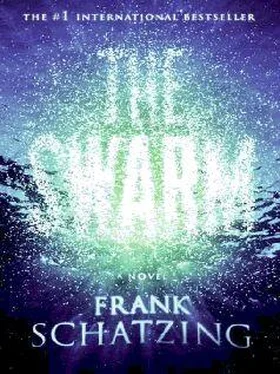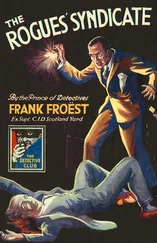But this was different.
Anawak wasn't sure if he was watching the whale or if it was watching him. The enormous mammal didn't seem interested in the boat. Looking out from under its elephantine lid, the humpback's eye was fixed on him. Beneath the surface, whales had acute vision, but outside their natural element they were damned to short-sightedness by their globular eyes. Close up like that, though, the humpback must be able to see him as clearly as he could see it.
Slowly, so that he did not frighten it, Anawak stretched out an arm and stroked the smooth, damp skin. The whale showed no sign of wanting to dive. Its eye shifted focus slightly, but returned to him. There was something almost intimate about the scene. As pleased as he was to see the animal, Anawak wondered what it stood to gain from such a lengthy observation. Under normal circumstances a skyhop lasted seconds. It cost a lot of energy to stay vertical like that.
'Where've you been all this time?' he asked.
A barely audible splash sounded from the other side of the boat. Anawak swivelled just in time to see another head rising from the water. The second was smaller than the first, but just as close. It, too, fixed Anawak with a black eye.
What did they want from him?
Uneasiness crept over him. It wasn't normal for whales to stare fixedly like that. He'd never seen anything like it. All the same he couldn't resist bending down to his bag and fishing out his digital camera. He held it up in the air. 'Now, keep nice and still…'
Maybe the camera was a mistake. If so, it was the first time in the history of whale-watching that humpbacks had objected to having their picture taken. As if on command, the two enormous heads vanished, like a pair of islands sinking beneath the waves. There were a few quiet gurgling noises, a slurp and some bubbles, then Anawak was alone again on the shimmering sea.
The sun was rising over the nearby coast. Mist hung over the mountains. The grey water was turning blue.
Not a whale in sight.
Anawak released the air from his lungs and stuffed the camera back into the open bag. He was about to pick up the binoculars when he thought better of it. His two new friends couldn't have gone far yet. He pulled out the cassette-recorder, put on the headphones and lowered the hydrophone slowly into the water. The headphones crackled, plunked and droned, but there was nothing to indicate the presence of a whale. Anawak waited, expecting to hear the distinctive call of a humpback, but everything was quiet.
In the end he hauled the hydrophone back on board.
Some time later he spotted clouds of spray in the distance, but that was the last he saw of them.
On the way back to Tofino, he thought about how tourists would have reacted to the spectacle – and how they'd react if it happened again. The news would travel fast. Davie's and their tame whales – they'd be inundated with bookings.
Fantastic!
As the Zodiac forged ahead through the still waters of the bay, Anawak stared out at the nearby forest. It was almost too fantastic.
Trondheim, Norway
Sigur Johanson woke with a start, groped for his alarm-clock, then realised his phone was ringing. Rubbing his eyes and swearing, he hauled himself upright, but his sense of balance eluded him and he fell back on to his pillow. His head was spinning.
He tried to remember the previous night. They'd stayed out late drinking, he, some colleagues and a few students. They'd only meant to have dinner at Havfruen, a restaurant in a converted wharf warehouse not far from Gamle Bybro, the old town bridge. It served great seafood and some very good wine. Some truly excellent wine, he recalled. From their table next to the window they'd looked out at the Nid, with its jetties pointing upstream and the little boats, and watched the river flow leisurely towards the nearby Trondheim fjord. Someone had started to tell jokes, then Johanson had gone with the owner into the restaurant's dank wine-cellar to inspect the precious vintage bottles…
He sighed. I'm fifty-six, he told himself, as he pulled himself up again. I shouldn't do this any more.
The telephone was still ringing. He got to his feet and stumbled into the living room. Was he supposed to be lecturing that morning? He imagined himself standing in front of his students, looking every minute of his age, barely able to stop his chin sagging on to his chest. His tongue felt heavy and furred, disinclined to do anything involving speech.
When he reached the phone it dawned on him that it was Saturday. His mood improved dramatically. Johanson,' he answered, sounding unexpectedly lucid.
'You took your time,' said Tina Lund.
Johanson rolled his eyes and lowered himself into an armchair. 'What time is it?'
'Half past six.'
'It's Saturday.'
'I know it is. Is something wrong? You don't sound too good.'
I'm not feeling too good. Why the hell are you phoning me at this uncivilised hour?'
Lund giggled. 'I was hoping to talk you into coming over to Tyholt.'
'To the institute? For Christ's sake, Tina, why?'
'I thought we could have breakfast together. It'll be fun. Kare's in Trondheim for a few days, and I know he'd love to see you.' She paused. 'Besides, there's something I want your opinion on.'
'What?'
'Not on the phone. So, are you coming or not?'
'All right, give me an hour,' said Johanson. He yawned expansively, then stopped in case he strained his jaw. 'In fact, give me two. I'll call in at the lab on the way. There might be news on the worms.'
'Let's hope so. Weird, isn't it? First I was the one making all the fuss, and now it's the other way round. OK, take your time – but don't be too long!'
'At your service,' Johanson mumbled. Still dizzy, he dragged himself off to the shower.
Thirty minutes later, he was feeling more alive. Outside, it was sunny and Kirkegata Street was all but deserted. The last piles of snow had melted and as Johanson drove out towards the Gloshaugen campus he was whistling Vivaldi. The university was supposed to be closed at the weekend, but no one paid any attention to the rules: it was the best time to sort your mail and work undisturbed.
Johanson went to the post-room, rummaged in his pigeon-hole and pulled out a thick envelope. It had been sent from Kiel and almost certainly contained the lab results that Lund was so desperate to see. He stowed it away, unopened, went back to his car and resumed his journey to Tyholt.
The Institute for Marine Technology, or Marintek, as it was known, had close links with the NTNU, SINTEF and the Statoil research centre. In addition to its collection of simulation tanks and wave tunnels, it also housed the world's biggest artificial ocean-research basin, offering scientists scale-model testing in simulated wind and waves. The Norwegian shelf was covered with floating production systems that had been tested in the eighty-metre-long by ten-metre-deep pool. Two wave machines created miniature currents and storms that seemed terrifyingly powerful. Johanson was pretty sure that Lund would use it to test the underwater unit that she was planning for the slope.
As he had expected, he found her at the poolside, talking to some scientists. There was something droll about the scene. Divers were weaving through the blue-green water past Toytown platforms, while miniature tankers floated past lab staff in rowing-boats. It resembled a cross between a toy-shop and a boating party, but it had a serious purpose: the offshore industry needed Marintek's blessing before any new structure could be built.
Lund spotted him, broke off her conversation and headed over. It meant walking all the way round the pool, which she did at her usual canter.
'Why not take a boat?' asked Johanson.
Читать дальше












